In recent years, the importance of gut health has gained significant attention, with probiotics and prebiotics emerging as key players in maintaining a healthy digestive system. This article delves into the latest research, benefits, and sources of these beneficial microorganisms, providing you with a comprehensive guide to improving your gut health.
Understanding Probiotics and Prebiotics
Probiotics are live microorganisms that, when consumed in adequate amounts, confer health benefits to the host. They are often referred to as “good” or “friendly” bacteria because they help maintain the balance of the gut microbiota, the community of microorganisms living in our intestines1. Prebiotics, on the other hand, are non-digestible food components that promote the growth of beneficial bacteria in the gut. They serve as food for probiotics, enhancing their effectiveness2.
The Importance of Gut Health
The gut is often called the “second brain” due to its significant impact on overall health. A healthy gut microbiota is essential for various bodily functions, including digestion, immune response, and even mental health. Imbalances in gut bacteria have been linked to numerous health issues, such as irritable bowel syndrome (IBS), obesity, and mental health disorders3.
Latest Research on Probiotics and Gut Health
Recent studies have highlighted the potential of next-generation probiotics (NGPs) in altering the gut microbiome and impacting various diseases. For instance, strains like Eubacterium hallii, Faecalibacterium prausnitzii, and Akkermansia muciniphila have shown promise in enhancing gastrointestinal immunity, retaining intestinal barrier integrity, and generating valuable metabolites4. Additionally, a diet rich in fermented foods has been found to increase microbiome diversity and decrease inflammatory markers, further emphasizing the role of probiotics in gut health5.
Benefits of Probiotics and Prebiotics
- Improved Digestion: Probiotics help break down food and absorb nutrients more efficiently. They can alleviate symptoms of digestive disorders like IBS and inflammatory bowel disease (IBD)6.
- Enhanced Immune Function: A significant portion of the immune system resides in the gut. Probiotics can boost immune responses and reduce the risk of infections7.
- Mental Health Benefits: Emerging research suggests a strong connection between gut health and mental well-being. Probiotics may help reduce symptoms of anxiety and depression by influencing the gut-brain axis8.
- Weight Management: Certain probiotic strains have been linked to weight loss and reduced belly fat. They may help regulate appetite and metabolism9.
- Reduced Inflammation: Probiotics can decrease the production of inflammatory proteins, potentially lowering the risk of chronic diseases like rheumatoid arthritis and type 2 diabetes10.
Sources of Probiotics
Incorporating probiotic-rich foods into your diet is a natural way to boost gut health. Here are some excellent sources:
- Yogurt: Made by fermenting milk with beneficial bacteria, yogurt is one of the most popular probiotic foods11.
- Kefir: A fermented milk drink that contains a diverse range of probiotic strains12.
- Sauerkraut: Fermented cabbage that is rich in probiotics and vitamins13.
- Kimchi: A spicy Korean dish made from fermented vegetables14.
- Miso: A traditional Japanese paste made from fermented soybeans.
- Tempeh: A fermented soybean product that is a great source of probiotics and protein.
- Kombucha: A fermented tea drink that is gaining popularity for its probiotic content.
How to Incorporate Probiotics and Prebiotics into Your Diet
To maximize the benefits of probiotics, it’s essential to pair them with prebiotics. Here are some tips:
- Combine Probiotic and Prebiotic Foods: Foods like yogurt with bananas or kefir with oats provide both probiotics and prebiotics, creating a synbiotic effect.
- Eat a Variety of Fermented Foods: Incorporate different sources of probiotics into your diet to ensure a diverse gut microbiota.
- Include High-Fiber Foods: Prebiotics are found in high-fiber foods like garlic, onions, asparagus, and whole grains.
Conclusion
The growing recognition of the importance of gut health and the role of probiotics and prebiotics offers exciting opportunities for improving overall well-being. By staying informed about the latest research and incorporating probiotic-rich foods into your diet, you can take proactive steps towards a healthier gut and a healthier you.
By focusing on the latest research, benefits, and sources of probiotics, this article aims to provide valuable insights that can drive engagement and improve SEO. Remember to use relevant keywords such as “probiotics,” “gut health,” “prebiotics,” and “benefits of probiotics” throughout the article to optimize it for search engines.





